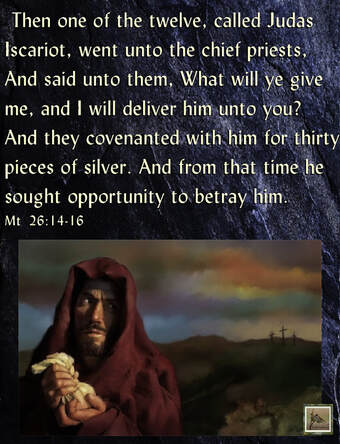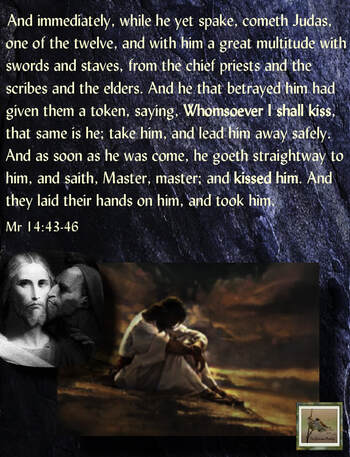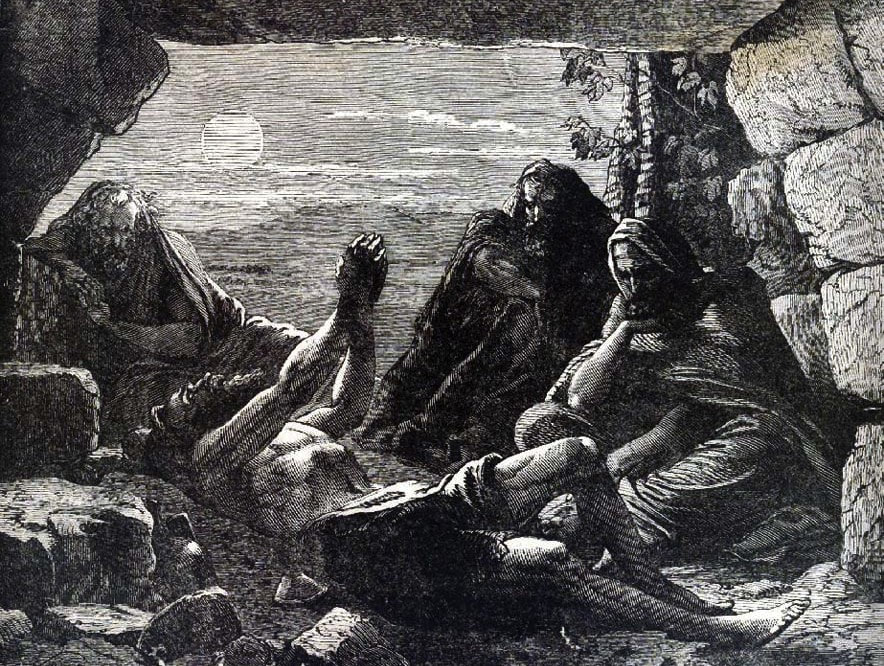Then entered Satan into Judas surnamed Iscariot, being of the number of the twelve. And he went his way, and communed with the chief priests and captains, how he might betray him unto them. And they were glad, and covenanted to give him money. And he promised, and sought opportunity to betray him unto them in the absence of the multitude. Luke 22:3-6
The devil filled the heart of Judas with avarice; and that infamous passion led him to commit the crime here specified. This at once accounts for the whole of this most unprincipled and unnatural transaction. None but a devil, or he who is possessed by one, could have been guilty of it: - let the living lay this to heart. A minister of the Gospel, who is a lover of money, is constantly betraying the interests of Christ. He cannot serve two masters; and while his heart is possessed with the love of self, the love of God and zeal for perishing souls cannot dwell in him. What Satan could not do by the envy and malice of the high priests and Pharisees, he effects by Judas, a false and fallen minister of the Gospel of God. None are so dangerous to the interests of Christianity as persons of this stamp. Adam Clarke
There's several accounts of Jesus taking note of Judas being a traitor, it was evident that He knew the heart of Judas, from the beginning.
Joh 6:70 Jesus answered them, Have not I chosen you twelve, and one of you is a devil?
Joh 6:71 He spake of Judas Iscariot the son of Simon: for he it was that should betray him, being one of the twelve.
Joh 12:4 Then saith one of his disciples, Judas Iscariot, Simon's son, which should betray him,
Joh 12:5 Why was not this ointment sold for three hundred pence, and given to the poor?
Joh 12:6 This he said, not that he cared for the poor; but because he was a thief, and had the bag, and bare what was put therein.
Joh 12:7 Then said Jesus, Let her alone: against the day of my burying hath she kept this.
Joh 12:8 For the poor always ye have with you; but me ye have not always.
Joh 13:21 When Jesus had thus said, he was troubled in spirit, and testified, and said, Verily, verily, I say unto you, that one of you shall betray me.
Joh 13:22 Then the disciples looked one on another, doubting of whom he spake.
Joh 13:23 Now there was leaning on Jesus' bosom one of his disciples, whom Jesus loved.
Joh 13:24 Simon Peter therefore beckoned to him, that he should ask who it should be of whom he spake.
Joh 13:25 He then lying on Jesus' breast saith unto him, Lord, who is it?
Joh 13:26 Jesus answered, He it is, to whom I shall give a sop, when I have dipped it. And when he had dipped the sop, he gave it to Judas Iscariot, the son of Simon.
Joh 13:27 And after the sop Satan entered into him. Then said Jesus unto him, That thou doest, do quickly.
Satan entered into him - He had entered into him before, and now he enters again, to strengthen him in his purpose of delivering up his Master. But the morsel was not the cause of this entering in; the giving of it only marks the time in which the devil confirmed Judas in his traitorous purpose. Some have thought that this morsel was the sacrament of the Lord’s Supper: but this is an utter mistake.
That thou doest, do quickly - As if he had said: “Thou art past all counsel; thou hast filled up the measure of thy iniquity, and hast wholly abandoned thyself to Satan; I will not force thee to turn from thy purpose, and without this thou wilt not. Thy designs are all known to me; what thou art determined to do, and I to permit, do directly; delay not, I am ready.”
Adam Clarke
There's several accounts of Jesus taking note of Judas being a traitor, it was evident that He knew the heart of Judas, from the beginning.
Joh 6:70 Jesus answered them, Have not I chosen you twelve, and one of you is a devil?
Joh 6:71 He spake of Judas Iscariot the son of Simon: for he it was that should betray him, being one of the twelve.
Joh 12:4 Then saith one of his disciples, Judas Iscariot, Simon's son, which should betray him,
Joh 12:5 Why was not this ointment sold for three hundred pence, and given to the poor?
Joh 12:6 This he said, not that he cared for the poor; but because he was a thief, and had the bag, and bare what was put therein.
Joh 12:7 Then said Jesus, Let her alone: against the day of my burying hath she kept this.
Joh 12:8 For the poor always ye have with you; but me ye have not always.
Joh 13:21 When Jesus had thus said, he was troubled in spirit, and testified, and said, Verily, verily, I say unto you, that one of you shall betray me.
Joh 13:22 Then the disciples looked one on another, doubting of whom he spake.
Joh 13:23 Now there was leaning on Jesus' bosom one of his disciples, whom Jesus loved.
Joh 13:24 Simon Peter therefore beckoned to him, that he should ask who it should be of whom he spake.
Joh 13:25 He then lying on Jesus' breast saith unto him, Lord, who is it?
Joh 13:26 Jesus answered, He it is, to whom I shall give a sop, when I have dipped it. And when he had dipped the sop, he gave it to Judas Iscariot, the son of Simon.
Joh 13:27 And after the sop Satan entered into him. Then said Jesus unto him, That thou doest, do quickly.
Satan entered into him - He had entered into him before, and now he enters again, to strengthen him in his purpose of delivering up his Master. But the morsel was not the cause of this entering in; the giving of it only marks the time in which the devil confirmed Judas in his traitorous purpose. Some have thought that this morsel was the sacrament of the Lord’s Supper: but this is an utter mistake.
That thou doest, do quickly - As if he had said: “Thou art past all counsel; thou hast filled up the measure of thy iniquity, and hast wholly abandoned thyself to Satan; I will not force thee to turn from thy purpose, and without this thou wilt not. Thy designs are all known to me; what thou art determined to do, and I to permit, do directly; delay not, I am ready.”
Adam Clarke
SELLING OR SERVING THE MASTER
The world seemed in arms against the greatest Lover of souls that had ever trod earth’s soil. Satan entered the heart of Judas, for it was his hour, and he gathered all his strength for one last prodigious effort to overthrow the Son of man and thwart His sublime purpose of redemption. Judas, one of the inner circle, did not hesitate to choose thirty pieces of silver rather than love, purity, compassion, as they were incarnate in the Son of man. The religious leaders of the age also eagerly caught at their chance.
In the meanwhile the Lord girded Himself for the conflict by gathering to His heart the remainder of the apostolic band, though none of them really understood. The arrangement of the man with the waterpot was evidently to elude arrest during the supper, as Judas could not inform his accomplices beforehand of the selected supper room. Remember that Jesus asks each of us for the guest chamber of our heart! Ask Him, not to be as a wayfaring man who tarries for the night, but to abide always. F.B. Meyer
In the meanwhile the Lord girded Himself for the conflict by gathering to His heart the remainder of the apostolic band, though none of them really understood. The arrangement of the man with the waterpot was evidently to elude arrest during the supper, as Judas could not inform his accomplices beforehand of the selected supper room. Remember that Jesus asks each of us for the guest chamber of our heart! Ask Him, not to be as a wayfaring man who tarries for the night, but to abide always. F.B. Meyer
Betrayal and Arrest of Jesus
And while he yet spake, behold a multitude, and he that was called Judas, one of the twelve, went before them, and drew near unto Jesus to kiss him. But Jesus said unto him, Judas, betrayest thou the
Son of man with a kiss? Luke 22:47-48
Son of man with a kiss? Luke 22:47-48
By the “Son of man” was evidently meant “the Messiah.” Judas had had the most satisfactory evidence of that, and did not doubt it. A kiss was the sign of affection. By that slight artifice Judas thought to conceal his base purpose. Jesus with severity reproaches him for it. Every word is emphatic. “Betrayest” thou - dost thou violate all thy obligations of fidelity, and deliver thy Master up to death? Betrayest “thou” - thou, so long with him, so much favored, so sure that this is the Messiah? Betrayest thou “the Son of man” - the Messiah, the hope of the nations, the desire of all people, the world’s Redeemer? Betrayest thou the Son of man “with a kiss” - the sign of friendship and affection employed in a base and wicked purpose, intending to add deceit, disguise, and the prostitution of a mark of affection to the “crime of treason?” Every word of this must have gone to the very soul of Judas. Perhaps few reproofs of crime more resemble the awful searchings of the souls of the wicked in the day of judgment. Albert Barnes
The Traitor’s Kiss
Consider some of the traits, and moral lessons to be conveyed to us:
I. A TRAITOR AMONG THE DISCIPLES. Many of them were weak in faith and carnal in apprehension, but only one a traitor.
II. THE CHARACTERISTIC OF HIS TREASON. Betrayed Lord into cruel hands of foes. Professed followers of Christ may betray Him to the scorn of the world, giving the sceptic arguments for his infidelity, and the worldly excuses for rejection of Christ.
III. THE MANNER OF THE BETRAYAL. A kiss.
1. It was the accepted token of affection.
2. It was here prostituted to the basest of uses.
3. It was received with lamblike meekness by Him who knew it meant treachery.
IV. THEY BETRAY THE SON OF MAN WITH A KISS WHO--
1. Compliment and deny Him with the same lips,
2. Profess to be united with Him at His table, and then act as lovers and servants of the world.
3. Exalt His humanity to the skies, and deny His rightful divinity and the efficacy of the atonement. (Homiletic Review.)
1. We see how needful it is that we, each one of us, look well to the state of our own hearts. Here is a man who knew the truth, who had preached the truth, who had wrought miracles for the sake of the truth; and yet became a castaway. Now, why was this? He “held the truth in unrighteousness.” The man who has been a hypocrite in religion is very rarely recovered; he deceives others, but yet more fatally does he deceive himself.
2. Again: the history teaches us how little security against our falling away, there is in the possession of eminent spiritual advantages. “Judas Iscariot, one of the twelve.”
3. Again: we learn from this history how insensible and unperceived is the progress of the downward course in sin. When a man once enters on the way of transgression, he can never tell where he shall stop. Neither wickedness nor holiness attain to their full stature all at once. We cannot suppose that Judas had the remotest thought of his treachery when he first accepted the invitation to become one of the apostles.
4. The enslaving power of the love of this present world. (D. Moore, M. A.)
I. A TRAITOR AMONG THE DISCIPLES. Many of them were weak in faith and carnal in apprehension, but only one a traitor.
II. THE CHARACTERISTIC OF HIS TREASON. Betrayed Lord into cruel hands of foes. Professed followers of Christ may betray Him to the scorn of the world, giving the sceptic arguments for his infidelity, and the worldly excuses for rejection of Christ.
III. THE MANNER OF THE BETRAYAL. A kiss.
1. It was the accepted token of affection.
2. It was here prostituted to the basest of uses.
3. It was received with lamblike meekness by Him who knew it meant treachery.
IV. THEY BETRAY THE SON OF MAN WITH A KISS WHO--
1. Compliment and deny Him with the same lips,
2. Profess to be united with Him at His table, and then act as lovers and servants of the world.
3. Exalt His humanity to the skies, and deny His rightful divinity and the efficacy of the atonement. (Homiletic Review.)
1. We see how needful it is that we, each one of us, look well to the state of our own hearts. Here is a man who knew the truth, who had preached the truth, who had wrought miracles for the sake of the truth; and yet became a castaway. Now, why was this? He “held the truth in unrighteousness.” The man who has been a hypocrite in religion is very rarely recovered; he deceives others, but yet more fatally does he deceive himself.
2. Again: the history teaches us how little security against our falling away, there is in the possession of eminent spiritual advantages. “Judas Iscariot, one of the twelve.”
3. Again: we learn from this history how insensible and unperceived is the progress of the downward course in sin. When a man once enters on the way of transgression, he can never tell where he shall stop. Neither wickedness nor holiness attain to their full stature all at once. We cannot suppose that Judas had the remotest thought of his treachery when he first accepted the invitation to become one of the apostles.
4. The enslaving power of the love of this present world. (D. Moore, M. A.)

















